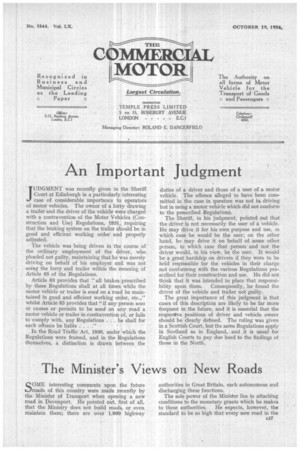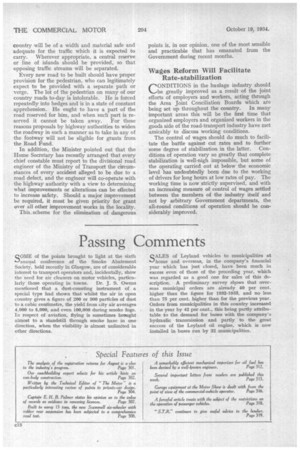The Minister's Views on New Roads
Page 39

Page 40

If you've noticed an error in this article please click here to report it so we can fix it.
SOME interesting comments upon the future roads of this country were made recently by the Minister of Transport when opening a new road in Devonport. He pointed out, first of all, that the Ministry does not build roads, or even. maintain them; there are over 1,000 highway authorities in Great Britain, each autonomous and discharging these functions.
The sole power of the Minister lies in attaching conditions to the monetary grants which he makes to these authorities. He expects, however, the standard to be so high that every new road in the country will be of a width and material safe and adequate for the traffic which it is expected to carry. Wherever appropriate, a central reserve or line of islands should be provided, so that opposing traffic streams will be separated.
Every new road to be built should have proper provision for the pedestrian, who can legitimately expect to be provided with a separate path or verge. The lot of the pedestrian on many of our country roads to-day is intolerable. He is forced repeatedly into hedges and is in a state of constant apprehension. He ought to have a part of the road reserved for him, and when such part is reserved it cannot be taken away. For these reasons proposals by highway authorities to widen the roadway in such a manner as to take in any of the footway will not be eligible for grants from the Road Fund.
In addition, the Minister pointed out that the Home Secretary has recently arranged that every chief constable must report to the divisional road engineer of the Ministry of Transport the circumstances of every accident alleged to be due to a road defect, and the engineer will co-operate with the highway authority with a view to determining what improvements or alterations can be effected to increase safety. Should a major improvement be required, it must be given priority for grant over all other improvement works in the locality. This, scheme for the elimination of dangerous points is, in our opinion, one of the most sensible and practicable that has emanated from the Government during recent months.
Wages Reform, Will Facilitate Rate-stabilization
OONDITIONS in the haulage industry should be greatly improved as a result of the joint efforts of employers and workers, acting through the Area Joint Conciliation Boards which are being set up throughout the country. In many important areas this will be the first time that organized employers and organized workers in the goods side of the road-transport industry have met amicably to discuss working conditions.
The control of wages should do much to facilitate the battle against cut rates and to further some degree of stabilization in the latter. Conditions of operation vary so greatly that complete stabilization is well-nigh impossible, but some of the operating carried out at below the economic level has undoubtedly been due to the working of drivers for long hours at low rates of pay. The working time is now strictly supervised, and with an increasing measure of control of wages settled between the members of the industry itself and not by arbitrary Government departments, the all-round conditions of operation should be considerably improved.












































































































